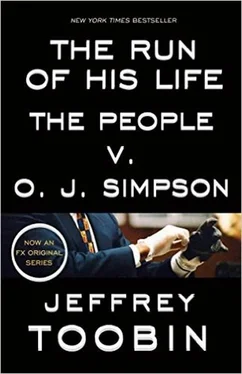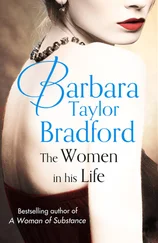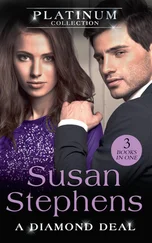After the trial, most of the jurors said that the McKinny tapes had had little impact on their verdict. Even if one accepts this at face value, the tapes still had an enormous influence on the trial. The entire gestalt of the case was transformed. Because the tapes established definitively that Fuhrman had lied about using the word “nigger,” the prosecution had to abandon its categorical defense of him. This was true even after Ito’s unduly restrictive ruling regarding playing the tapes in front of the jury. Fuhrman’s damaged credibility, in turn, made it that much harder for the prosecution to argue that all the other LAPD officers were telling the truth. In terms of the courtroom chess match, the damage to the prosecution from the tapes was probably as great as from Darden’s glove demonstration.
The tapes also loom as an important historical artifact beyond the give-and-take of this trial. It may never be possible to sort out how much of Fuhrman’s narrative was literally true. In the aftermath of the case, the LAPD and the United States attorney in Los Angeles launched investigations based on the tapes. Fuhrman’s extraordinary account of the beating of suspects following the shooting of two police officers did appear to be loosely based on a real event that occurred in 1978, but his version had fictional aspects as well. However, the tapes also pointed to larger truths. MAW existed. Mark Fuhrman-and others like him-thrived in the LAPD. Ultimately, it is not surprising that black jurors decide to punish the police for its sorry past and that, alas, O.J. Simpson turned out to be the undeserving beneficiary of this ignoble tale.

After McKinny’s brief turn on the stand, the defense closed its case with three more witnesses who testified that they had heard Fuhrman use the word “nigger.” As if this were not enough, the defense team decided to send one final nonverbal message. When Ito said he would not tell the jury that Fuhrman had refused to testify further, Cochran arranged for the entire defense team to wear ties made from African kente cloth in protest-in front of the jury, no less.
Ito could have stopped them. Very early in the trial, the judge had told the prosecutors that they could not wear angel pins in solidarity with the victims of the case, even though, unlike the kente-cloth ties, the pins bore no provocative message. But on the day the defense team wore the ties, Judge Ito had only this to say to the first defense lawyer to appear before him:
“Nice tie.”
One night toward the end of the Fuhrman-tapes controversy, many leading figures of the African-American community in Los Angeles filled the vast Santa Monica Civic Auditorium for the annual Soul Train Lady of Soul Awards. Gladys Knight hosted this annual salute to black women in show business, and at the climax of the nationally televised broadcast of the ceremony, she said she had a special announcement. “To present the Lena Horne Award for outstanding career achievements,” Knight said, “here is a man who has been a wonderful friend to all of us… a longtime supporter of everything good and positive that takes place in our community-Mr. Johnnie Cochran!”
Cochran appeared from behind a curtain, splendidly turned out in a perfect tuxedo and bright red cummerbund. The audience of three thousand burst into loud cheers when Cochran stepped forward, a greeting that quickly turned into a standing ovation, the warmest greeting any celebrity received at the event that evening. A handful of spectators started a chant, which spread in a few seconds to the entire crowd:
“Free O.J.!”
“Free O.J.!”
“Free O.J.!”
Standing at center stage, Cochran acknowledged the cheer with a pontifical wave. “I promise I’ll work hard to do that,” he said. Then he turned to introduce a brief highlight film of the life of the career-achievement winner, actress and dancer Debbie Allen. These highlights, Cochran told the group with a knowing smile, amounted to “what I would call concrete visual evidence.” This was real evidence as opposed to that which Cochran spent his workweek examining.
By the end of the trial, Cochran had become his client’s surrogate, and the lawyer took every opportunity to promote the Simpson cause outside the courtroom. After court nearly every Friday during the last weeks of the trial, Cochran headed for the airport en route to speaking engagements around the country-including journeys to Florida, South Carolina, Louisiana, Pennsylvania, and Washington and around California. In his remarks, he invariably seized on the Simpson case as the paradigmatic civil rights issue of the day. On August 20 in Philadelphia, for example, Cochran urged the National Association of Black Journalists to “take on the forces of this country. If you do that, you are using journalism for good… and if you duck this fight, you’ll leave a gaping hole, and the battle for civil rights is lost.” Cochran charged that coverage of the Simpson trial had been too oriented toward the victims. “Even Simpson himself was a victim,” he told the audience of fifteen hundred. “We believe he is wrongfully charged, and he, too, became a victim, but there has been no talk about that.” Paraphrasing the novelist Richard Wright, Cochran told the gathered reporters, “We black folk are history. We are cast in the familiar role as America’s conscience.”
Cochran was even more explicit when, following the last week of testimony in the Simpson trial, he traveled to Washington and spoke before an adoring crowd at the annual legislative conference of the Congressional Black Caucus. In his speech there, he called the trial in Los Angeles the latest landmark in the long civil rights struggle of African-Americans-a series of events that, as he summarized it, included Plessy v. Ferguson , Brown v. Board of Education , the Rodney King trial, and, “yes, even the Simpson case.”
It is difficult to determine with precision what impact Cochran’s speeches had on the jury. In interviews after the trial, jurors said they had been unaware of Cochran’s specific public assertions about the case. Yet Cochran’s behavior over the course of the entire case, both in court and especially in public toward the end, attempted to define the case solely in racial terms. By the end of the case, all the jurors did know how contentious a national civil rights issue the trial had become. Thus, Cochran’s waving of the bloody shirt of racial resentment must be judged a tactical success. When excused juror Jeanette Harris paraphrased the worries of jurors in the case-“An African-American might say, ‘I can’t say he’s guilty because I want to walk out of here’ ”-she reflected the heightened political sensitivities about the case, which Cochran helped foment.
Cochran’s high public profile had another impact as well: It drove Robert Shapiro crazy. In part, Shapiro’s reaction arose from simple jealousy over the attention paid to Cochran, especially in comparison with his own ever more negligible role in the defense. Also, as racial perceptions over the case hardened, Shapiro’s position in his own (white) world grew ever more uncomfortable. In this respect, Cochran had nothing but contempt for Shapiro’s uneasiness. “I know Shapiro’s problem,” Cochran said to allies on the defense team, “but I’m a hero in my community.”
I had an unusually direct view of Shapiro’s dilemma. In May 1995, Mark Fuhrman filed a libel suit against me, The New Yorker , and Shapiro in connection with my original story about Fuhrman the previous year. (Fuhrman would drop his case during the week of the verdict.) Although Shapiro had generally steered clear of me after that issue of The New Yorker ran, the libel case started his competitive juices flowing, and we often talked about it in the courthouse hallway. In short order, however, Shapiro would turn these conversations into diatribes against his colleagues on the defense team, especially Cochran (even more than Bailey). One day during the presentation of the defense case, for example, Shapiro told me that Cochran had interrupted him when he was talking to a lawyer for one of the witnesses. “I’m shaking hands with this lawyer, and you know what he says to me?” Shapiro recounted. “He says, ‘We got no time for chitchat. We got to work now.’ ” Shapiro went on, “I’ve never been treated this way in my life. It’s like they want me to look bad. In front of the jury, they give me questions to ask, and they’re bad questions.” The heart of Shapiro’s complaints always returned, however, to publicity. “Johnnie keeps track of what show everyone is on. He watches everything. He doesn’t work. It’s unbelievable.” Shapiro did have a point about Cochran’s obsession with the media (which, of course, was matched by Shapiro’s). On September 7, for example, Cochran sent a memo to all the defense attorneys saying, “Effective immediately, per Mr. O.J. Simpson’s request, all media appearances must be approved by yours truly. There will be no exceptions to this policy.”
Читать дальше













